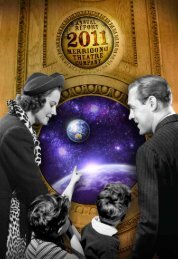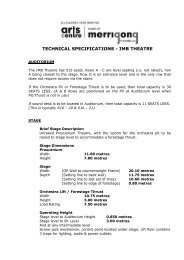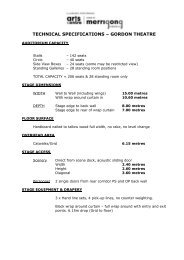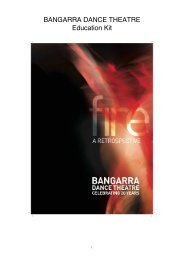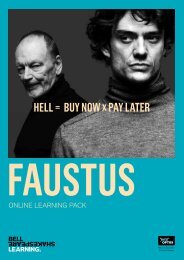UNTRAINED
UNTRAINED - Merrigong Theatre Company
UNTRAINED - Merrigong Theatre Company
- No tags were found...
You also want an ePaper? Increase the reach of your titles
YUMPU automatically turns print PDFs into web optimized ePapers that Google loves.
other and us. We have guessed at and largely learnt this not from the brief images of the<br />
men alone, but from their work together.<br />
There's even a moment where, with cards and textas, the men stand at the four corners of<br />
the frame and sketch each other's faces, then show the results to the audience. In another,<br />
they display photo- graphs of themselves, and elsewhere, videos they've directed. They<br />
even comment on each other's dance and visual art capacities. But it's the dancing itself<br />
which is most revealing. One after another the performers execute a move; as the image<br />
mutates the effect is of a visual Chinese whisper. More brief moves—balances, kicks, spins,<br />
painfully slow motion extensions—ensue and morph. Ross Coulter wittily removes his shoe<br />
and uses it puppet-like to mimic a slow motion fall while his body remains at rest. The tasks<br />
grow more demanding, if leavened with moments of yawning or sighing, or long jumps, or<br />
solo songs or speaking backwards, or performing favourite pop culture figures. The<br />
extended copying duets break the frame as each trained performer follows an untrained<br />
around the space and then the roles are reversed—concentration, effort, surprise and<br />
amusement are palpable.<br />
These competitive duets tell us much. Obarzanek tries very hard, he's a bit of a performer<br />
(naturally inclined to dance when he sings in his emphatic baritone); Coulter is economical,<br />
more low key, laconic, if nonetheless committed. With the trained dancers the differences<br />
are subtler; theirs is an easy-going naturalism, the singing more polished, personalities less<br />
overtly expressed. Not surprisingly it's their dancing which is telling: Perry's spring-loaded,<br />
quietly dramatic articulacy, Hamilton's sinuous, rippling intensity.<br />
As well as the duets, there's recurrent group work which comes affectingly into its own at<br />
the end—where you find yourself wishing that there'd been more of it, as big a demand as<br />
that might be. In the course of the show, the group moans, cries and, among other things,<br />
demonstrates various, revealing techniques for removing and putting on t-shirts. Above all<br />
the men collectively convey an undemonstrative competitiveness, mutual empathy and<br />
good humour as they perform their long list of tasks, while the audience doubtlessly<br />
reflects on what its own dance abilities might be in the same circumstances.<br />
Perhaps, too, the audience think about the pleasure of witnessing a benign image of men<br />
collaborating and competing without corporate, militaristic and sporting straitjacketings.<br />
However well or not they can dance, these men flow, as Klaus Theweleit put it in his antifascist<br />
classic Male Fantasies (1977), and the sense of them as real and complex, beyond<br />
artifice, is rooted in the lucid pragmatism of Guerin's task-based formulation for Untrained.<br />
http://www.realtimearts.net/feature/Dance_Massive/9382



